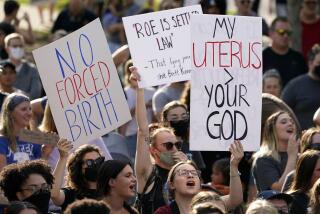Irish Girl Wins Right to Travel for an Abortion
- Share via
LONDON — The Irish Supreme Court on Wednesday reversed a lower-court ruling that prohibited a 14-year-old girl, allegedly raped by a friend’s father, from traveling to England to undergo an abortion.
The decision in the case--which had become a European cause celebre --was welcomed by Irish Prime Minister Albert Reynolds as well as by women’s rights groups in Ireland, England and on the Continent. The Roman Catholic Church and anti-abortion groups also expressed relief that the case had been resolved swiftly.
Reynolds, who was in London for talks with Prime Minister John Major on Northern Ireland, said it is up to the girl’s family to decide what to do next. The girl’s whereabouts were kept secret throughout the three-day hearing, and it was unclear when--or even if--she would travel to Britain for the abortion.
The five Supreme Court justices had not been expected to announce their decision in the case until the week’s end. But the hearing came to an abrupt halt Wednesday when Chief Justice Thomas Finlay declared: “The court is satisfied that this appeal should be allowed and that the (lower) court decision should be set aside.” Finlay said his colleagues will give their legal opinions in writing at a later date.
Lawyers for the girl had argued that prohibiting her from traveling to London violated sections of the Irish constitution ensuring civil liberties. They also said the travel ban violated United Nations and European Community conventions allowing citizens freedom of movement between member countries.
Although Ireland permits the use of a “morning-after pill” that terminates pregnancies in the first 72 hours, an amendment to the Irish constitution, passed in a divisive national referendum in 1983, prohibits abortion for any reason--except to save the life of the mother.
The girl says that she was molested for more than a year by the father of another pupil in her convent school and that he then raped her. She is said to be 12 weeks pregnant. The man has been questioned by the police but has not been charged.
The case came to the attention of Irish authorities when the father of the girl--who had been brought to London--suggested that a fetal tissue sample, taken after an abortion, could be used to genetically identify the man who raped the girl.
Although thousands of Irish women seek abortions in England every year, Atty. Gen. Harry Whelehan issued an order barring the procedure for the girl; when she returned to Ireland, she was forbidden to travel abroad for the operation.
Her father has said that psychologists have examined his daughter and deem her suicidal because of the alleged rape and ensuing pregnancy.
Sensing that the weight of public opinion is with the girl, the prime minister ordered that the government pay the estimated $100,000 cost to appeal the lower court ruling, issued nine days ago. The deliberations, which began Monday, were conducted in closed sessions so it was not known what legal thinking went into the justices’ decision.
Told of the ruling as he flew to London, Reynolds--who only recently took office and has sought to avert a potentially bruising political battle over abortion--told reporters: “From a humanitarian point of view, I welcome the decision. It has been a sad and distressful case, and I am glad that everything is over.”
Women’s groups also welcomed the decision. Carmel Foley, chief executive at the Council for the Status of Women, which represents a spectrum of women’s groups in Ireland, said: “We’re just delighted that the Supreme Court has taken this decision. For the family, we hope their trauma can now be at an end and they will be out of the glare of the public spotlight. From the government, we are expecting a very clear statement of what implications there will be in future cases.”
Dick Spring, the leader of the Irish Labor Party, said the ruling will be “greeted by many thousands of people with both relief and gratitude. In particular, and above all, this decision will now give the family at the center of this tragedy, and especially the child involved, an opportunity to take whatever decision they believe is right for them.”
The British Pregnancy Advisory Service, through spokeswoman Tara Kaufmann, declared: “A huge social disaster has been averted. This is a beacon of hope for all women in Ireland. Every parent must be breathing a sigh of relief.”
The Society for the Protection of the Unborn Child--an anti-abortion group--said the decision was no more than it had expected. Phyllis Bowman, the group’s director, added, however: “We think the manner in which this 14-year-old girl has been used by those seeking to promote abortion is appalling.”
The girl’s case had created a furor in predominantly Roman Catholic Ireland. Des Cryan, assistant director of the Catholic Press and Information Office, said the church rules out abortion in all circumstances. “But it can only be a matter of satisfaction to all concerned that the legal issues in this case have been resolved with the minimum of delay,” Cryan said in a statement.
The Irish Times had compared the handling of the girl’s case to the ruthless policies in Romania under the deposed regime of Nicolae Ceaucescu. Demonstrations were held in Dublin protesting the lower court ruling. Dublin’s Sunday Independent published an opinion poll indicating that the case had led most Irish to now believe that the constitution’s abortion clause should be changed.
More to Read
Sign up for Essential California
The most important California stories and recommendations in your inbox every morning.
You may occasionally receive promotional content from the Los Angeles Times.













